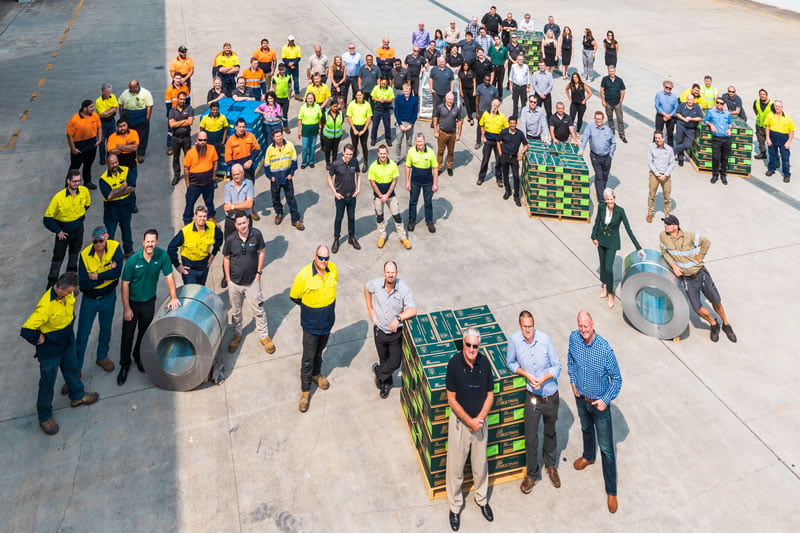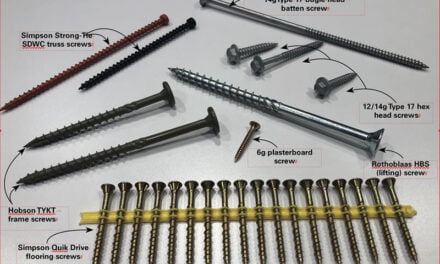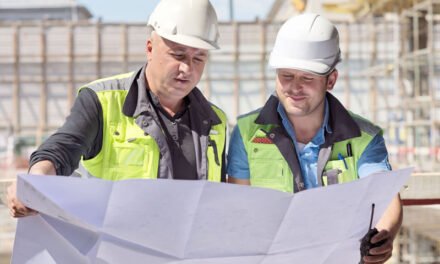Behind today’s smoothly efficient products is a journey that’s been far from seamless, but one in which the company has survived and thrived with good humour and perseverance. By Jane Clark
When Peter Taylor founded Multinail in 1979, he expected a few challenges along the way. But not as many as turned out to be waiting for him!
Multinail prevailed and celebrates turning 40 this year. Just how the company weathered the challenges along the way is a story of resilience, a committed family, a tenacious engineer and a group of people dedicated to the company’s success.
Starting out
In the late 1970s, Taylor was the manager at Sanford Truss Australia. He didn’t see eye to eye with the corporate owners and, at the encouragement of many of his customers, decided to go out on his own. He figured he had built-up long-term relationships with many of his customers and would be able to count on some of their business. A competitor got wind of Taylor’s plans and bought Sanford Truss outright, scuppering his neatly laid plans for an easy early customer base for his independent alternative to the established global corporates.
“It was a tough struggle – by the time Sanford Truss was purchased, I was already committed. I had a choice to drop everything or keep pushing forward,” Peter says.
With a young family to support, Peter decided he had to keep going. Much of his career had been built on his ability to form trusted relationships, and it wasn’t long before he met Reg Hubbard, who owned Hastings Trusses in Port Macquarie. Reg knew Jim Cheney, who was just starting up, and convinced him to become a Multinail truss plant. Westruss became Multinail’s first external customer – and remains a loyal customer to this day.
Like most small businesses just starting out, cashflow was tight. Trent Taylor, Peter’s son and now chief operating officer at Multinail, has memories of he and his brother Travis selling plants at the side of the road to bring some money in.
“Dad had purchased a property that had a nursery. Because cash flow was nonexistent, Mum and Dad grew plants at night. We’d take these plants to the markets at Port Macquarie on the weekend and would also sell them by the side of the road,” Trent says.
Peter and his wife worked incredibly hard, and the two boys pitched in where they could, however the fledgling business was beset by challenges over the next few years.
In the early ’80s, a minor cyclone blew all the windows out of Multinail’s office in Wauchope, lifting the roof and depositing part of the factory in the next property. While insurance covered the damage, a fair amount of work was required to fix everything.
One Easter weekend a semi-trailer carrying 24 tonnes of nail plate rolled near Kempsey. This time the insurance company refused to cover the loss, claiming the nail plates could be repackaged and sold.
“I was unwilling to send out nail plates that had been compromised, so we ended up burying the whole 24 tonnes on our site. It wasn’t a great feeling watching that, believe me,” Peter relates.
By this stage, Multinail had a small team of dedicated staff led by Peter and Doug Dobinson. “We had several fabricators in Brisbane waiting for their nail plate delivery. We rang all the people in the stamping division and asked them to come in over Easter. It was a big ask, but they pulled it off. Because of these wonderful staff, we didn’t let anyone down,” says Peter.
Peter still attributes Multinail’s wonderful staff culture today to Dobinson, who started working for the company at the age of 65.
“Before we moved to Wauchope, we were renting in Port Macquarie. I was struggling doing everything – engineering, production, bookkeeping. Doug came on board as a bookkeeper working two-and-a-half days a week. When the company grew, he got involved in production, dispatch, people management – nearly everything. He was my right-hand man and indispensable.”
Dobinson was also a loveable larrikin, and a slight irreverence still permeates Multinail’s culture today. “A lot of the culture of the place goes back to Doug… he was able to pull everyone together into a coherent, productive, caring staff who know how to have fun,” says Peter.
One step forwards…
The company was growing, and in 1985 Peter decided to start a machinery division. They built a second shed on the Wauchope site, but not long afterwards the new structure burnt to the ground.
“One day coming home from a work trip I met a guy at the airport, and he asked me how my factory was. I said it was fine as far as I knew… but he then told me that the story was in the papers that the factory had burnt down. We had lost a whole lot of machinery due to the heat, melting the electrics,” Peter says.
Peter says it was his staff and family that kept him going through all these challenges. “I had a huge sense of responsibility not just to my own family, but to my staff and their families. Once a business is a certain size and you start employing people, you’ve got to put your head down. You can’t just give up.”
Multinail was starting to grow market share when the company faced its greatest challenge. In 1994, one of company’s corporate competitors stole one third of Multinail’s customers, breaking their contracts. It was Multinail’s biggest challenge yet, and Peter says it almost sent them to the wall: “It took us eight years to have our case heard in court. It was a significant commercial litigation case which made legal history in Queensland. In the end we won, but those eight years were extremely tough. We lost one third of our sales overnight, we were paying legal fees and we were forced to let go of staff. It really put us on the back foot.”
In the end, the Supreme Court of Queensland ruled that the competitor had induced the breaches of contract and awarded a settlement and costs to Multinail. For Peter, the experience made him even more determined to build a successful company.
But while he was tough and tenacious enough to fight the case all the way through, he credits the survival of the company through such significant challenges to a very different set of intangible values: “My approach from day one has been the same with staff as with customers – that you treat them with respect. Our customers are mostly family businesses, and the culture that permeates Multinail is to treat everyone – staff and customers alike – as part of an extended family.
“We have many customers who are still with us – because of relationships formed 30, 40 years ago. They’re still with us because someone cares about them – they’re not just a number,” Peter says.
The younger generation of Taylors has kept the focus on supporting the staff, which has helped build corporate resilience. Travis Taylor, now chief building systems officer, credits the work ethic of Multinail’s staff for keeping things going during far wider problems. “During the GFC, while everyone else was downsizing, we didn’t let go of any of our key staff,” Travis says.
“Finances got very tight, but we all pulled together and kept the business going. We still had new software and products coming out and we were still pushing hard to service our customers. It’s a testament to the people we were employing and the culture that has been built from day one.”
In 2016, the company decided to build a new technology and manufacturing hub where all staff outside of the state offices were moved to the one location in Stapylton. Last year the project was completed and 125 staff moved into the complex.
“I think this has been one of our better decisions,” says Peter. “We’ve moved all staff – from finance, service, stamping, machinery and software – into the one building. It allows staff to socialise and collaborate more, to learn about the other departments, and to contribute ideas outside of their own areas. It has worked very well.”
Getting machinery right
Multinail today is a successful company enjoying a period of significant growth. Peter believes their investment in machinery is key to this growth. Multinail machinery is renowned in the industry and has clearly differentiated the company in the market. Its reputation for longevity and reliability comes from Peter’s company-changing quality-control decision after an early disaster.
“Years ago, I made the decision to start offering machinery to our customers. It all started with a secondhand press head. I asked a company in Coffs Harbour to build six. Within three months of selling these to customers around Australia, they all broke in half. The people who made them didn’t weld in the correct place, which meant that after a certain number of presses, the whole thing fell apart,” says Peter.
As an engineer, Peter was horrified. Embarrassed, he determined this would never happen again and decided to create a machinery division in-house.
“This is why we over-spec and over-design our equipment to the point some would describe as agricultural engineering,” Trent says. “We brought it all in-house. It cost money, we needed more staff and a whole new area of understanding. But it also meant we could manage the quality, satisfy more customers and provide servicing as well.”
It was this investment in machinery that shook off Multinail’s ‘little brother’ perception in the market. The company was now offering the full package to the frame and truss market.
“Six years ago,” Trent says, “we decided to get fully into machinery. We acquired Spida and Mango, and we’ve recently acquired another company in the US. Our machinery offering is not limited to the local market anymore – we are looking at significant opportunities overseas.”
It’s this combination or innovation, investment, support, servicing and a willingness to do the R&D work required to develop cutting-edge machinery technology that keeps so many customers loyal.
“Innovation is everything,” says Trent. “We now have a significant number of developers in our machinery division, almost 50% more than we have in our design software team. We’re applying far more technology to our machinery. From robotics and machine learning, we’re coming out with machines that will be game changers in terms of automation, reducing operator numbers and increasing productivity. These are exciting times.”
Technology is not only assisting staff and customers; it’s also transforming the industry. Mid-rise and offsite timber manufacturing are where Multinail sees massive opportunity for its customers in coming years.
As Peter says, “Many builders are tired of steel, concrete and the unions. They see opportunity from North America and Europe to use more structural timber in more complicated high-rise buildings. Technology is changing what we can build with timber. We’re finding that builders are coming to us with ideas as to whether we can achieve designs with products.”
Reflecting on the last 40 years and the numerous challenges Multinail has overcome, Peter sums up how the company’s longevity has been achieved: “Surround yourself with exceptional people who are specialists in their field and who really love the work they do. Treat your staff – no matter what their role is – and your customers, large or small, with respect. Trust and value your staff – don’t micromanage. Invest in technology and innovate… never sit still, always learn, collaborate and involve your customers along the way.
“When I look back at where we’ve come from and where we are now, I’m proud, but I’m also sad. Over the last 40 years, I’ve also aged 40 years. I wish I had more time in the industry – it keeps growing, changing, it’s a very exciting industry to be involved in. The future of Multinail looks very bright.”
For more details and history, visit www.multinail.com.au











